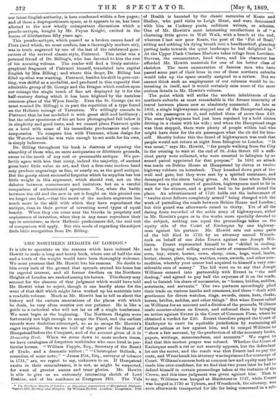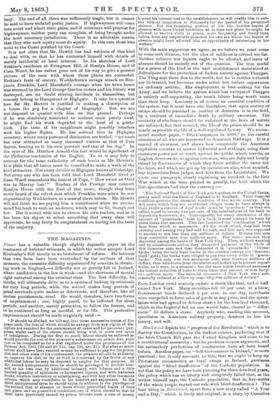THE NORTHERN HEIGHTS OF LONDON.*
IT is idle to speculate on the reasons which have induced Mr. Hewitt to make a long and heavy book, where one of half the size and a tenth of the weight would have been thoroughly welcome. We must presume that Mr. Howitt has his reasons. No doubt to him every inch of the ground that spreads around his home has its especial interest, and all former dwellers on the Northern Heights of London are ranked among his heroes. This theory may account for the absence of that judgment which would have told Mr. Howitt what to reject, though it can hardly atone for the want of that skill which might have worked up his materials into a readable volume. Much as Mr. Howitt has to tell us about the history and the curious associations of the places with which he deals, he very often wearies out our patience. He is like a guide in a cathedral who will not let us off a single tombstone. We must begin at the beginning. The Northern Heights were fortunately not high enough to escape the Flood, and the earliest records were doubtless submerged, so as to escape Mr. Howitt's eager inquiries. But we are told of the grant of the Manor of Hampstead before the Conquest, and of the account given of it in Domesday Book. When we come down to more modern times, we have catalogues of forgotten multitudes who once lived in particular houses. "William Popple, Esq., Secretary of the Board of Trade, and a dramatic author ; " "Christopher Bullock, a comedian of some note;" "James Pitt, Esq., surveyor of tobacco in 1731," are, we regret to say, unknown to us. If Hampstead exults in their remembrance, it is not, as might be suspected, for want of greater names and truer glories. Mr. Howitt is able to give us an extremely interesting sketch of Lord Erskine, and of his residence at Evergreen Hill. The Vale
of Health is haunted by the classic memories of Keats and Shelley, who paid visits to Leigh Hunt, and were denounced with him as Cockney poets, seditious writers, or atheists. One of Mr. Howitt's most interesting recollections is of "a charming little grove in Well Walk, with a bench at the end, whereon I last saw poor Keats, the poet of the 'Pot of Basil,' sitting and sobbing his dying breath into a handkerchief, glancing parting looks towards the quiet landscape he had delighted in." At the Upper Flask Clarissa Harlowe takes refuge from Lovelace. Stevens, the commentator, lived there, and his -character has afforded Mr. Howitt materials for one of his better class of sketches. The mere enumeration of famous men who have passed some part of their lives in one of these northern suburbs would take up the space usually assigned to a review. But we cannot think such an employment of our columns would be interesting in itself, and it would certainly miss some of the most curious details in Mr. Howitt's volume.
The point which will strike the modern inhabitants of the northern suburbs as most remarkable is the former insecurity of travel between places now BO absolutely connected. As late as 1803, a single highwayman stopped one of the Hampstead stages with six passengers in it, and robbed them of more than £40. The same highwayman had just been repulsed by a bold citizen driving in a chaise with his wife ; and when the Hampatead stage was thus stopped, there were plenty of people within hail who might have done for the six passengers what the cit did for himself. Shortly before this the dread of highwaymen was such that people would not return at night from Islington to London. "It was usual," says Mr. Howitt, "for people walking from the City in the evening to wait at the end of St. John Street till a sufficient party were collected, who were escorted to Islington by an armed patrol appointed for that purpose." In 1681 an attack was made on Pelsize House at Hampstead by eleven or twelve highway robbers on horseback. They knocked down part of the wall and gate, but they were met by a spirited resistance, and decamped on the alarm being given. At the time when Belsize House was a great resort of gamblers, highwaymen used to lie in wait for the winners, and a guard had to be posted round the place. An advertisement of 1720 holds out the inducement of "twelve stout fellows completely armed" being charged with the work of patrolling the roads between Belsize House and London ; but this guard was afterwards raised to thirty. Yet of all the daring feats recorded of the noble army of highwaymen, either in Mr. Howitt's pages or in the works more specially devoted to the subject, nothing can equal the proceedings taken on the equity side of the Court of Exchequer by one highwayman against his partner. Mr. Howitt sets out some parts of the bill filed in 1725 by an attorney named Wreathcock on behalf of one John Everet against one Joseph Williams. Everet represented himself to be "skilled in dealing, and in buying and selling several sorts of commodities, such as corn, hay, straw, horses, cows, sheep, oxen, hogs, wool, lambs, butter, cheese, plate, rings, watches, canes, swords, and other commodities, whereby your orator had acquired to himself a very considerable sum of money." The bill went on to say that Joseph Williams entered into partnership with Everet in "the said dealing," and agreed to pay half the expenses of it on the roads, and to furnish his share of necessaries, as "horses, bridles, saddles, assistants, and servants." The two partners accordingly plied their trade on various heaths and commons, and there "dealt with gentlemen for divers watches, rings, swords, canes, hats, cloaks, horses, bridles, saddles, and other things." But when Everet called on Williams for an account and a division of the proceeds, Williams made counter-claims on Everet, and enforced them by bringing an action against Everet in the Court of Common Pleas, where he obtained a verdict for 2.20. Everet therefore prayed the Court of Exchequer to exert its equitable jurisdiction by restraining all farther actions at law against him, and to compel Williams to "show a fair account, by the production of all the necessary books, papers, writings, memorandums, and accounts." We regret to find that this modest prayer was refused. Whether the Court of Exchequer smelt a rat or not scarcely appears, but the defendant let out the secret, and the result was that Everet had to pay the costs, and Wreathcock his attorney was imprisoned for contempt of Court. Williams's success both at common law and equity may have made him over-confident, for we find that two years later he had to defend himself in certain proceedings taken at the instance of the Crown, and this time judgment was given against him. That is to say, Williams was hanged at Maidstone in 1727, while Everet was hanged in 1730 at Tyburn, and Wreathcock, the attorney, was I soon afterwards transported for life for being concerned in a rob
beep. The end of all three was sufficiently tragic, but it cannot be said to have violated poetic justice. If highwaymen will come into court and admit their gains, and if attorneys will practise for highwaymen, neither party can complain of being brought under the moat summary jurisdiction. There is an admirable maxim that they who seek equity must do equity. In this case those who went to the Court perished by the Court.
It is not often that Mr. Hewitt has had subjects of this kind to deal with, or that he has contented himself with details of merely incidental or local interest. In his sketches of Lord Erskine's residence at Evergreen Hill, of Roeslyn House, and of Caen Wood, he has rather gone out of his way to give a general picture of the men with whom those places are connected. Erskine's feats of oratory, Wedderburn's savage attack on Benjamin Franklin, Lord Mansfield's courage when his town house was stormed by the Lord George Gordon rioters and his library was destroyed, are no doubt stirring incidents in themselves, but scarcely belong to Hampstead or Highgate. It may be a question how far Mr. Hewitt is justified in making a description of a house the peg for a chapter of biography. But we are not disposed to quarrel with him on this ground. Perhaps if he was absolutely restricted to matters more purely local, he might find his work degraded to the level of a guidebook. The taste of his neighbours might possibly interfere with his higher flights. He has noticed that in Highgate cemetery, where many persons of distinction are buried, "no tomb has ever attracted so many thousand visitors as that of Tom Sayers, bearing on it his own portrait and that of his dog." In the eyes of Mr. Matthew Arnold this fact would be significant of the Philistine tendencies of the English. To us it may help to account for the tame catholicity of such books as Mr. Hewitt's. It is plain that all tastes must be consulted to make a work of the kind attractive. Not every dweller at Highgate knows of Coleridge. Not every one who has been told that Lord Mansfield lived at Caen Wood remembers the lament of Pope, "How sweet an Ovid was in Murray lost !" Readers of the Peerage may connect Rosslyn House with the Earl of that name, though they have never heard of the velvet coat which Franklin wore when he was stigmatized by Wedderburn as a malt of three letters. Mr. Hewitt will not think we are paying him a compliment when we recommend his book to such an audience, which may be fit, though not few. But it rested with him to choose his own readers, and as it has been his object to select something that every class will appreciate, he may fairly be congratulated on having hit the taste of the majority.































 Previous page
Previous page